Gareth Culligan, Stabannon,
Louth
Ground got wet quickly in Louth, says Gareth. While there was just 6ml of rain over the past week, the 30ml which fell the week before did the damage. Despite the odd wet corner, crops are holding up OK, however, and are developing well.
Gareth had to apply slug pellets to his winter wheat following oilseed rape after sowing. Despite some grazing by slugs, he doesn’t think they will need another application. His winter barley sown into winter wheat-chopped straw will likely need another half rate of pellets (Sluxx at 4kg/ha) as slug numbers are high.
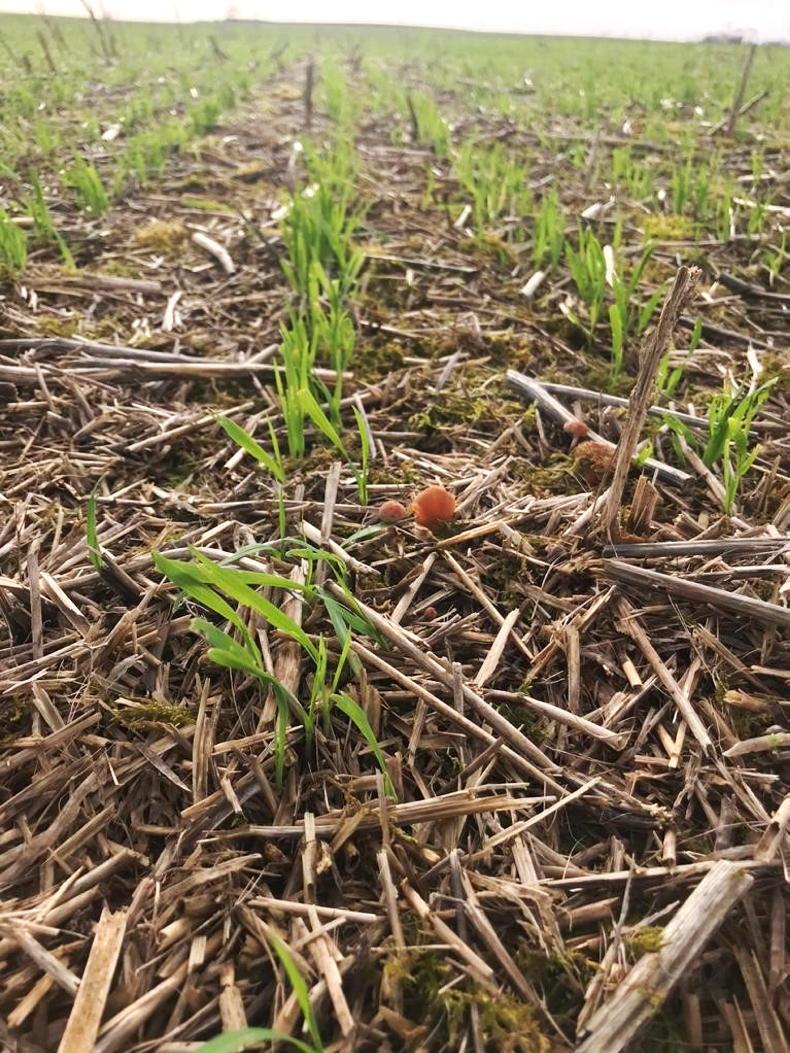
Gareth's winter barley drilled directly into chopped wheat straw.
His cereal crops have received no aphicide or herbicide. Instead, he has applied a foliar feed mix of magnesium, sulphur, boron, molybdenum and seaweed at a cost of €3.5/ac.
Winter beans
His winter bean crop was sown on 28 October along with a companion crop mix of wheat, barley, oats and linseed. All crops are emerging well and crow damage is limited. Gareth thinks the mixture of emerging crops had a positive impact on crow pressure.
The companion crop will be killed off in the spring. He wasn’t able to sow the remaining 100ac of winter beans which he had planned due to weather. Instead, he will sow that land in spring beans next spring. His various cover crop mixes are not performing well this year on account of the bad weather, he explains. While he thinks they are still doing some good, they are much smaller and weaker than what he would have liked.
He recently purchased an Outcast Teatnet pellet applicator which attaches to the boom of the sprayer
Elsewhere around the farm, Gareth is carrying out maintenance on machinery. He recently purchased an Outcast Teatnet pellet applicator which attaches to the boom of the sprayer. He intends to try to broadcast cover crop seed into standing crops, trace elements in the form of micro granules and maybe clover as a companion in an existing wheat crop next year.
Like most farmers and those in the industry, he has had a busy month for webinars. Base Ireland, of which Gareth is a founding member, is holding webinars each week for its members featuring a number of guest speakers.
Martin O’Regan, Kinsale,
Cork
There has been a lot of rain in Cork over the past couple of weeks, says Martin. Dry ground is still in reasonable condition but heavier ground is too wet to travel on. He was able to pull an amount of sugar and fodder beet on Sunday and Monday and he plans to spray some winter barley later this week if conditions allow.
Martin’s Husky winter oats were sown three weeks ago and are emerging well. Despite the wet weather, establishment has been very good. He will assess the crop in the spring and decide if a herbicide is needed. His winter wheat is coming along well.

Martin's winter barley on less-exposed ground.
Some of his winter barley in exposed land is looking weather-battered, with water-logging in headlands. However, crops on more sheltered land are looking quite good. Some of his winter barley has yet to receive a herbicide. If conditions allow, he will apply Firebird (0.3l/ha), DFF (0.3l/ha) as well as the aphicide Karate (50ml/ha) this week. He will also apply a manganese trace element spray.
Martin has heard reports of slug damage in the area but so far grazing has been limited in his own crops.
Beet
When harvesting beet with his twin-row Armer Salmon on Sunday, ground conditions were reasonable. However, when he moved to fodder beet on Monday, conditions were sticky. He washes all the beet. So far he thinks his fodder beet crops are yielding around 35t/ac while his sugar beet crops are yielding around 28t/ac.
Martin noted that reports from Cork, particularly in the east of the county, suggest crop yields have been affected by yellow virus. He noted a little virus in his crops but the yield impact appears to have been minimal.
All of his sowing and cultivating equipment has been washed, serviced and greased for winter storage. He doesn’t normally run antifreeze through his sprayer but instead, drains the tank and lines and stores it inside if he thinks conditions will be frosty.
Gerry McGrath, Tuam,
Galway
There isn’t much activity in the fields of Galway at this time of year, says Gerry. All crops are long since sown, potato crops are harvested and most stock are now housed for the winter.
While there was a number of settled days last week, heavy rain over the past fortnight has made ground conditions very wet. Despite the rain, Gerry’s winter crops are looking good with little to no signs of stress or bare patches. Water is lying in places, however.

Water is laying in places in Galway.
He sowed the crops early in good conditions meaning they got off to a good start, which has made all the difference, he explains. “This is a marked contrast to this time last year,” he says.
Gerry did note that some later crops in his area are under significant pressure due to water-logging. In many fields there are patches which may require resowing in the spring. These crops were sown in poorer conditions at the end of October and didn’t get off to a strong start.
Gerry will wait to the spring before deciding if his winter oats need a herbicide
His winter barley has received a herbicide and aphicide. Gerry will wait to the spring before deciding if his winter oats need a herbicide. Weed pressure was particularly low in his winter oats last season and they did not require any weed control.
Stock
Gerry is buying in store lambs to graze his cover crops. He has around two-thirds of the stock purchased and will buy another 100 more.
The crops on the headlands have gone backwards
The fodder rape and stubble turnip cover crop was sown in autumn using discs equipped with an air seeder. The crop got off to a great start and establishment was excellent. However, when the weather turned, and ground got wet, the crop appeared to stop growing, explains Gerry. The crops on the headlands have gone backwards.
This is the third year he has noticed this and now intends to look at other cover crop mixes. The lambs will graze the three fields from 1 December onwards.
However he questions the prospect of a worthwhile return from this venture as the stock are costing €15 to €20 more than other years.
Gareth Culligan, Stabannon,
Louth
Ground got wet quickly in Louth, says Gareth. While there was just 6ml of rain over the past week, the 30ml which fell the week before did the damage. Despite the odd wet corner, crops are holding up OK, however, and are developing well.
Gareth had to apply slug pellets to his winter wheat following oilseed rape after sowing. Despite some grazing by slugs, he doesn’t think they will need another application. His winter barley sown into winter wheat-chopped straw will likely need another half rate of pellets (Sluxx at 4kg/ha) as slug numbers are high.

Gareth's winter barley drilled directly into chopped wheat straw.
His cereal crops have received no aphicide or herbicide. Instead, he has applied a foliar feed mix of magnesium, sulphur, boron, molybdenum and seaweed at a cost of €3.5/ac.
Winter beans
His winter bean crop was sown on 28 October along with a companion crop mix of wheat, barley, oats and linseed. All crops are emerging well and crow damage is limited. Gareth thinks the mixture of emerging crops had a positive impact on crow pressure.
The companion crop will be killed off in the spring. He wasn’t able to sow the remaining 100ac of winter beans which he had planned due to weather. Instead, he will sow that land in spring beans next spring. His various cover crop mixes are not performing well this year on account of the bad weather, he explains. While he thinks they are still doing some good, they are much smaller and weaker than what he would have liked.
He recently purchased an Outcast Teatnet pellet applicator which attaches to the boom of the sprayer
Elsewhere around the farm, Gareth is carrying out maintenance on machinery. He recently purchased an Outcast Teatnet pellet applicator which attaches to the boom of the sprayer. He intends to try to broadcast cover crop seed into standing crops, trace elements in the form of micro granules and maybe clover as a companion in an existing wheat crop next year.
Like most farmers and those in the industry, he has had a busy month for webinars. Base Ireland, of which Gareth is a founding member, is holding webinars each week for its members featuring a number of guest speakers.
Martin O’Regan, Kinsale,
Cork
There has been a lot of rain in Cork over the past couple of weeks, says Martin. Dry ground is still in reasonable condition but heavier ground is too wet to travel on. He was able to pull an amount of sugar and fodder beet on Sunday and Monday and he plans to spray some winter barley later this week if conditions allow.
Martin’s Husky winter oats were sown three weeks ago and are emerging well. Despite the wet weather, establishment has been very good. He will assess the crop in the spring and decide if a herbicide is needed. His winter wheat is coming along well.

Martin's winter barley on less-exposed ground.
Some of his winter barley in exposed land is looking weather-battered, with water-logging in headlands. However, crops on more sheltered land are looking quite good. Some of his winter barley has yet to receive a herbicide. If conditions allow, he will apply Firebird (0.3l/ha), DFF (0.3l/ha) as well as the aphicide Karate (50ml/ha) this week. He will also apply a manganese trace element spray.
Martin has heard reports of slug damage in the area but so far grazing has been limited in his own crops.
Beet
When harvesting beet with his twin-row Armer Salmon on Sunday, ground conditions were reasonable. However, when he moved to fodder beet on Monday, conditions were sticky. He washes all the beet. So far he thinks his fodder beet crops are yielding around 35t/ac while his sugar beet crops are yielding around 28t/ac.
Martin noted that reports from Cork, particularly in the east of the county, suggest crop yields have been affected by yellow virus. He noted a little virus in his crops but the yield impact appears to have been minimal.
All of his sowing and cultivating equipment has been washed, serviced and greased for winter storage. He doesn’t normally run antifreeze through his sprayer but instead, drains the tank and lines and stores it inside if he thinks conditions will be frosty.
Gerry McGrath, Tuam,
Galway
There isn’t much activity in the fields of Galway at this time of year, says Gerry. All crops are long since sown, potato crops are harvested and most stock are now housed for the winter.
While there was a number of settled days last week, heavy rain over the past fortnight has made ground conditions very wet. Despite the rain, Gerry’s winter crops are looking good with little to no signs of stress or bare patches. Water is lying in places, however.

Water is laying in places in Galway.
He sowed the crops early in good conditions meaning they got off to a good start, which has made all the difference, he explains. “This is a marked contrast to this time last year,” he says.
Gerry did note that some later crops in his area are under significant pressure due to water-logging. In many fields there are patches which may require resowing in the spring. These crops were sown in poorer conditions at the end of October and didn’t get off to a strong start.
Gerry will wait to the spring before deciding if his winter oats need a herbicide
His winter barley has received a herbicide and aphicide. Gerry will wait to the spring before deciding if his winter oats need a herbicide. Weed pressure was particularly low in his winter oats last season and they did not require any weed control.
Stock
Gerry is buying in store lambs to graze his cover crops. He has around two-thirds of the stock purchased and will buy another 100 more.
The crops on the headlands have gone backwards
The fodder rape and stubble turnip cover crop was sown in autumn using discs equipped with an air seeder. The crop got off to a great start and establishment was excellent. However, when the weather turned, and ground got wet, the crop appeared to stop growing, explains Gerry. The crops on the headlands have gone backwards.
This is the third year he has noticed this and now intends to look at other cover crop mixes. The lambs will graze the three fields from 1 December onwards.
However he questions the prospect of a worthwhile return from this venture as the stock are costing €15 to €20 more than other years.






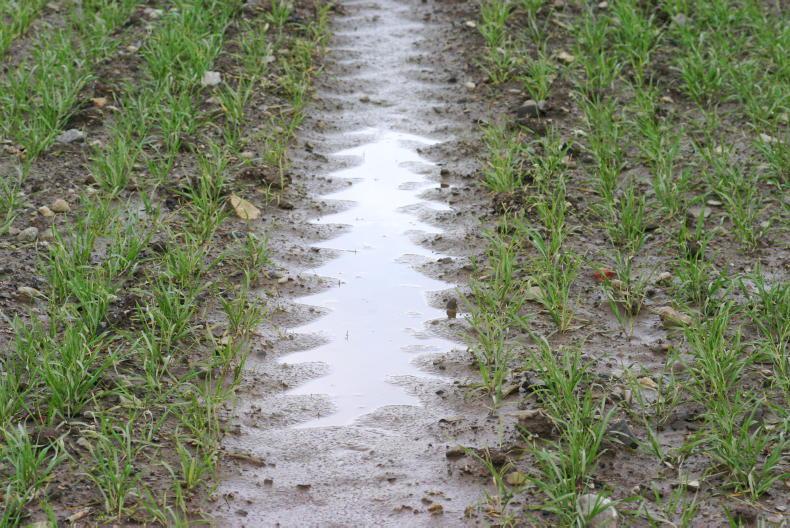
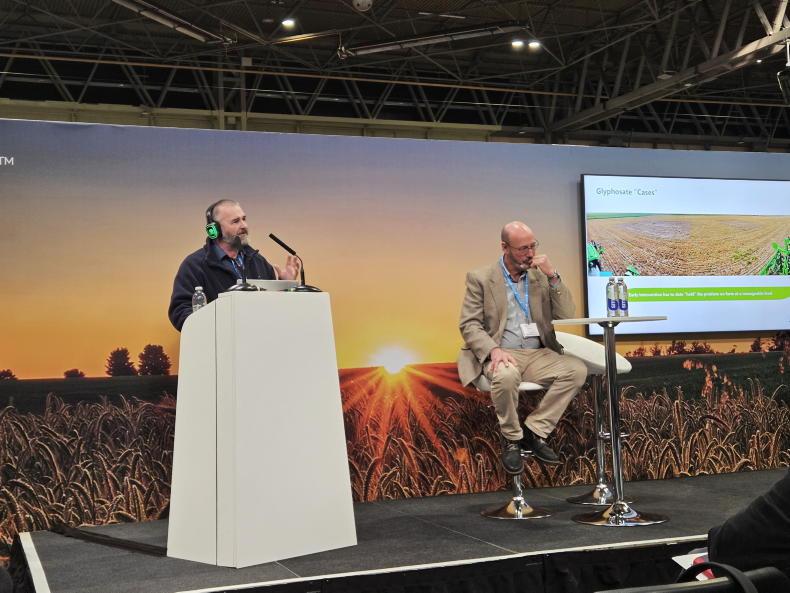
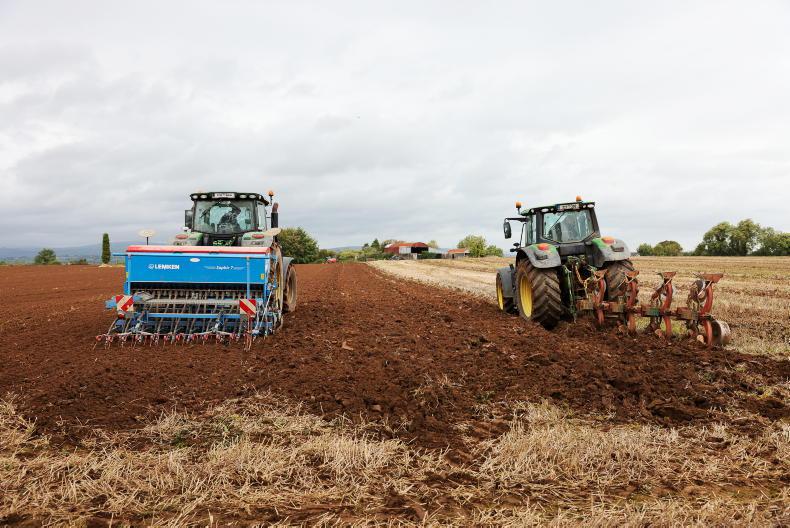
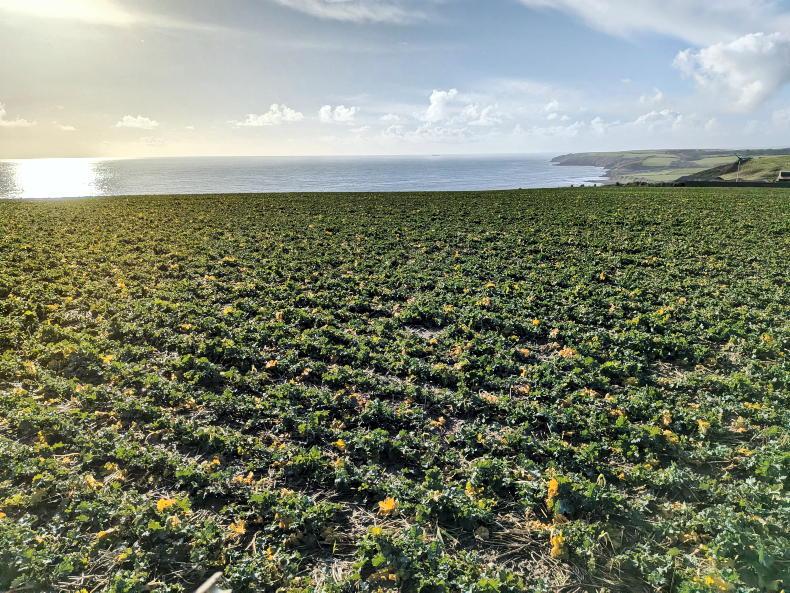
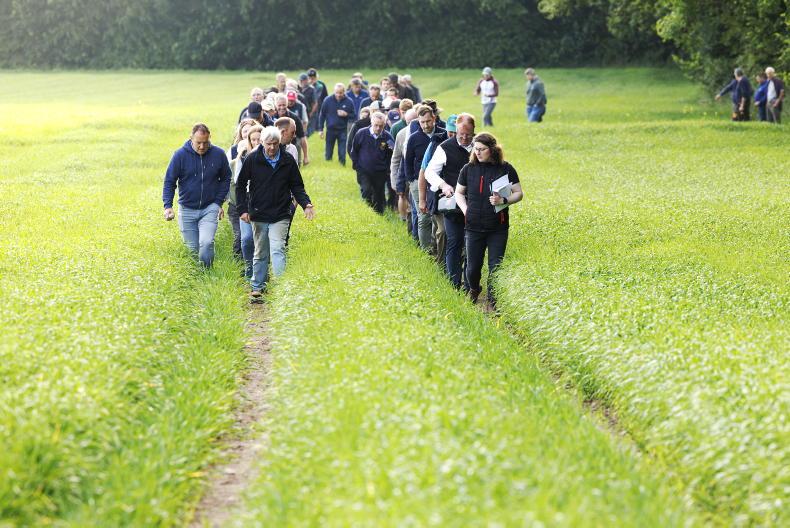
SHARING OPTIONS